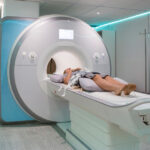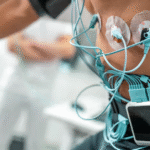A CT Coronary Angiogram is a non-invasive imaging test that utilises computed tomography (CT) to produce detailed 3D images of your coronary arteries. These arteries are responsible for delivering blood to your heart muscle, and this scan allows us to check for any blockages or narrowing due to plaque accumulation. This service is especially beneficial for individuals who are experiencing chest pain, have risk factors for coronary artery disease (CAD), or require a less invasive option compared to traditional coronary angiography. It serves as an essential tool for the early detection of potential heart issues, enabling timely intervention and preventive measures.
Procedure Overview
During a CT Coronary Angiogram, you’ll lie on a table that slides into a CT scanner. Before the scan, an intravenous (IV) line will be inserted to administer a contrast dye, which highlights the coronary arteries. You may also receive medication to slow your heart rate, ensuring clear images. The CT scanner rotates around you, taking multiple X-ray images. These images are then processed by a computer to create detailed 3D reconstructions of your coronary arteries. The procedure typically takes around 25-30 minutes. We utilise advanced multi-detector CT scanners that minimise radiation exposure and provide high-resolution images, ensuring accurate and reliable results.
Benefits & Importance
A CT Coronary Angiogram offers several advantages over traditional invasive angiography. It’s a non-invasive procedure, meaning there’s no need for catheters to be inserted into your arteries, reducing the risk of complications. It provides a comprehensive view of the coronary arteries, allowing for early detection of plaque buildup and blockages. This early detection allows for timely intervention, such as lifestyle changes, medication, or further procedures, which can significantly reduce the risk of heart attacks. By providing detailed anatomical information, it helps guide treatment decisions and avoid unnecessary invasive procedures.
Risks & Considerations
While a CT coronary angiogram is generally safe, there are potential risks associated with the contrast dye, including allergic reactions and kidney problems. The radiation exposure from the CT scan is also a consideration, although modern scanners use low-dose techniques. The procedure is not recommended for pregnant women. Individuals with severe kidney disease or uncontrolled hyperthyroidism may also have contraindications. It’s important to discuss your medical history and any concerns with your doctor to ensure the procedure is suitable for you.
Understanding the health of your coronary arteries is crucial for preventing heart disease. A CT Coronary Angiogram offers a non-invasive and accurate way to assess your risk and guide treatment decisions. If you’re experiencing chest pain, have risk factors for heart disease, or need a non-invasive alternative to traditional angiography, don’t hesitate.














